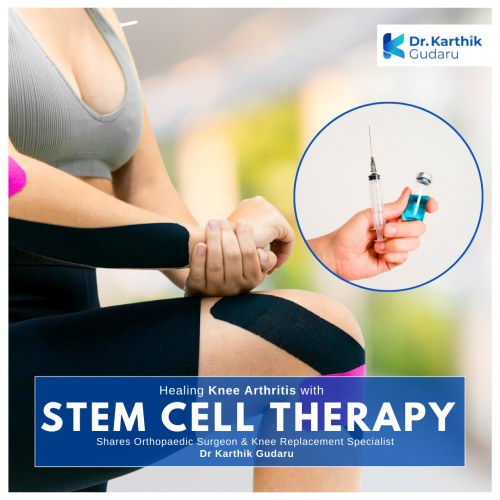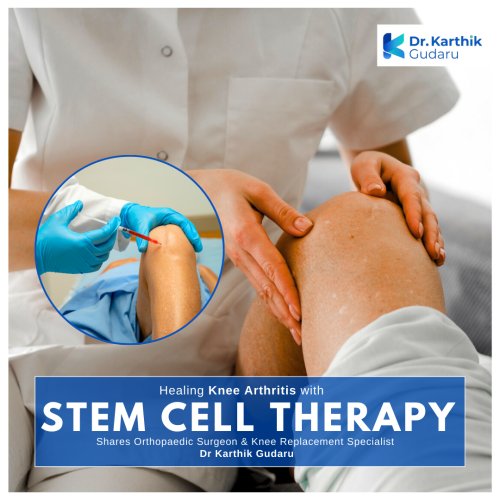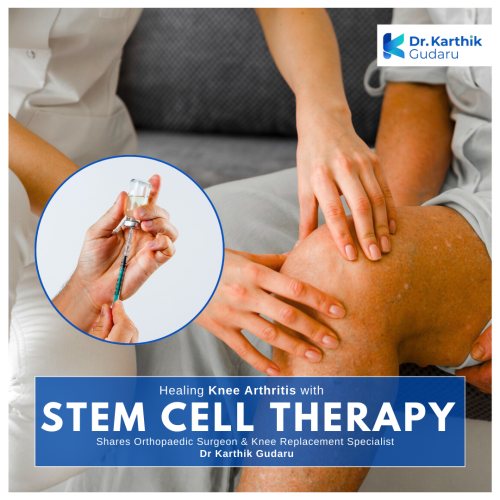Knee arthritis is a common degenerative condition causing pain, stiffness, and reduced mobility, affecting millions globally. Traditional treatments, including medications or physical therapy, often provide temporary relief but do not restore damaged cartilage. In recent years, stem cell therapy has emerged as a promising regenerative treatment for knee arthritis, aiming to repair damaged tissues and improve joint function naturally, says Dr Karthik Gudaru, who is one of the best orthopaedic surgeons in Hyderabad and Telangana and a leading orthopaedic specialist in treating knee joint arthritis with stem cell therapy in India.
What is Stem Cell Therapy?
Stem cell therapy is a medical treatment that uses specialised cells called stem cells to repair, regenerate, or replace damaged tissues in the body. Stem cells are unique because they can transform into various cell types, such as cartilage, bone, or muscle, depending on the body’s needs. This regenerative property makes stem cell therapy highly valuable for knee arthritis, where joint tissues deteriorate over time.
The most commonly used stem cells for orthopaedic treatments are mesenchymal stem cells (MSCs). These can be derived from the patient’s own body (autologous), such as bone marrow or fat tissue, reducing the risk of rejection, or from donor sources (allogeneic). These cells are processed in a controlled environment before therapeutic use.
What Are Stem Cell Injections for the Knee?
Stem cell injections for the knee involve delivering concentrated stem cells directly into the arthritic joint. The goal is to stimulate tissue repair, reduce inflammation, and relieve pain without invasive surgery. This minimally invasive procedure is usually performed under local anaesthesia and takes less than an hour.
During the process, stem cells are collected from bone marrow or fat tissue, concentrated, and purified. The prepared stem cells are then injected into the knee joint under ultrasound or fluoroscopy guidance to ensure accurate placement. Once injected, these cells can help reduce inflammation, promote cartilage regeneration, and improve overall joint function.
Pros and Cons of Stem Cell Therapy for Knee Arthritis
Pros:
- Potential to regenerate damaged cartilage and tissues.
- Minimally invasive compared to joint replacement surgery.
- Reduces pain and inflammation in the knee.
- Improves mobility and quality of life.
- Lower risk of rejection when using autologous stem cells.
Cons:
- Results can vary depending on arthritis severity, age, and overall health.
- Long-term effectiveness is still being studied.
- Not suitable for severe arthritis where joint replacement may be necessary.
- Can be expensive and may not always be covered by insurance.
When to Consult a Doctor?
Consulting a stem cell specialist orthopaedic doctor is crucial before considering stem cell therapy. Seek medical advice if you experience:
- Persistent knee pain or stiffness that limits daily activities.
- Swelling, inflammation, or discomfort that does not improve with conventional treatments.
- Difficulty walking, climbing stairs, or performing routine movements.
A specialist in orthopaedic surgery or regenerative medicine can assess the severity of your knee arthritis, discuss treatment options, and determine whether stem cell therapy is appropriate for you. Early consultation increases the chances of successful outcomes and prevents further joint deterioration.
Stem cell therapy offers a promising, regenerative approach for managing knee arthritis. By harnessing the body’s natural healing potential, stem cell injections can help repair damaged cartilage, reduce inflammation, and restore joint function. While not a replacement for surgery in advanced cases, it provides a minimally invasive alternative for those seeking relief and improved mobility. With careful patient selection and guidance from experienced specialists, stem cell therapy is poised to become a vital tool in treating degenerative joint diseases, offering hope for a pain-free and active future.

Dr Karthik Gudaru, MS Orthopaedics, MBBS, Fellowship in Knee and Hip Arthroplasty (USA), Fellowship in Computer-Assisted Navigation Joint Replacement Surgery (Germany), is one of Hyderabad’s leading orthopaedic surgeons with an outstanding reputation for precision, innovation, and excellence in joint replacement and orthopaedic care. Widely recognised as the best knee replacement specialist in Hyderabad, he brings a deep commitment to patient-centred care and cutting-edge surgical techniques.
Dr Karthik Gudaru is currently the Senior Orthopaedic and Joint Replacement Specialist, Department of Orthopaedics at GreenMed Hospital, Srinagar Colony, Hyderabad and Assistant Professor and Consultant Orthopaedic at BIRRD Hospital (Balaji Institute of Surgery, Research and Rehabilitation for the Disabled), Tirupati.
Dr Karthik Gudaru’s Treatment Specialisation are –
Knee Joint Treatments (Including Total Knee Replacement Surgery)
Shoulder Joint Treatments (Including Total Shoulder Replacement Surgery)
Hip Joint Treatments (Including Total Hip Replacement Surgery)
Elbow Joint Treatments (Including Total Elbow Arthroscopy)
Computer-Assisted Knee Replacement Surgery
Stem Cell Therapy for key orthopaedic treatments


